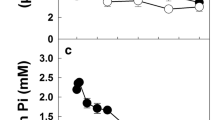Abstract.
In order to obtain general metabolic profiles of pyrimidine ribo- and deoxyribonucleotides in potato (Solanum tuberosum L.) plants, the in situ metabolic fate of various 14C-labelled precursors in disks from growing potato tubers was investigated. The activities of key enzymes in potato tuber extracts were also studied. The following results were obtained. Of the intermediates in de novo pyrimidine biosynthesis, [14C]carbamoylaspartate was converted to orotic acid and [2-14C]orotic acid was metabolized to nucleotides and RNA. UMP synthase, a bifunctional enzyme with activities of orotate phosphoribosyltransferase (EC 2.4.2.10) and orotidine 5′-monophosphate decarboxylase (EC 4.1.1.23), exhibited high activity. The rates of uptake of pyrimidine ribo- and deoxyribonucleosides by the disks were high, in the range 2.0–2.8 nmol (g FW)–1 h–1. The pyrimidine ribonucleosides, uridine and cytidine, were salvaged exclusively to nucleotides, by uridine/cytidine kinase (EC 2.7.1.48) and non-specific nucleoside phosphotransferase (EC 2.7.1.77). Cytidine was also salvaged after conversion to uridine by cytidine deaminase (EC 3.5.4.5) and the presence of this enzyme was demonstrated in cell-free tuber extracts. Deoxycytidine, a deoxyribonucleoside, was efficiently salvaged. Since deoxycytidine kinase (EC 2.7.1.74) activity was extremely low, non-specific nucleoside phosphotransferase (EC 2.7.1.77) probably participates in deoxycytidine salvage. Thymidine, which is another pyrimidine deoxyribonucleoside, was degraded and was not a good precursor for nucleotide synthesis. Virtually all the thymidine 5′-monophosphate synthesis from thymidine appeared to be catalyzed by phosphotransferase activity, since little thymidine kinase (EC 2.7.1.21) activity was detected. Of the pyrimidine bases, uracil, but not cytosine, was salvaged for nucleotide synthesis. Since uridine phosphorylase (EC 2.4.2.3) activity was not detected, uracil phosphoribosyltransferase (EC 2.4.2.9) seems to play the major role in uracil salvage. Uracil was degraded by the reductive pathway via β-ureidopropionate, but cytosine was not degraded. The activities of the cytosine-metabolizing enzymes observed in other organisms, pyrimidine nucleoside phosphorylase (EC 2.4.2.2) and cytosine deaminase (EC 3.5.4.1), were not detected in potato tuber extracts. Operation of the de novo synthesis of deoxyribonucleotides via ribonucleotide reductase and of the salvage pathway of deoxycytidine was demonstrated via the incorporation of radioactivity from both [2-14C]cytidine and [2-14C]deoxycytidine into DNA. A novel pathway converting deoxycytidine to uracil nucleotides was found and deoxycytidine deaminase (EC 3.5.4.14), an enzyme that may participate in this pathway, was detected in the tuber extracts.
Similar content being viewed by others
Author information
Authors and Affiliations
Additional information
Electronic Publication
Rights and permissions
About this article
Cite this article
Katahira, R., Ashihara, H. Profiles of pyrimidine biosynthesis, salvage and degradation in disks of potato (Solanum tuberosum L.) tubers. Planta 215, 821–828 (2002). https://doi.org/10.1007/s00425-002-0806-5
Received:
Accepted:
Issue Date:
DOI: https://doi.org/10.1007/s00425-002-0806-5




